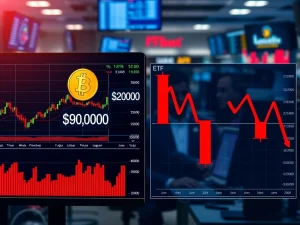Maple Finance Unlocks Major Solana DeFi Expansion via Chainlink CCIP

The world of decentralized finance is constantly evolving, with platforms seeking new avenues for growth and accessibility. For those tracking developments in the crypto space, a significant move is underway as Maple Finance, a prominent institutional crypto lending platform, sets its sights on the Solana network. This expansion marks a strategic step to tap into Solana’s high-speed environment and growing user base, bringing its specialized financial products to a wider audience.
Maple Finance Expands into Solana DeFi
Maple Finance, known for its on-chain capital markets, is officially expanding its operations to the Solana blockchain. This move is aimed at broadening the reach of its lending services beyond its initial base on Ethereum. By integrating with Solana, Maple Finance is positioning itself within a vibrant and rapidly developing ecosystem. The goal is to provide institutions and advanced DeFi participants on Solana with access to Maple’s offerings, establishing a deeper and more stable foundation for lending, trading, and collateral provision within the network.
Leveraging Chainlink CCIP for Seamless Integration
A key technical enabler for Maple Finance’s expansion is the integration with Chainlink’s Cross-Chain Interoperability Protocol (CCIP). Chainlink CCIP facilitates secure and reliable data transfer between different blockchain environments, specifically enabling communication between Ethereum Virtual Machine (EVM) and Solana Virtual Machine (SVM) ecosystems. This cross-chain capability is crucial for platforms like Maple Finance that operate across multiple networks, allowing for more efficient and cost-effective scaling. The successful implementation of Chainlink CCIP on Solana mainnet in May paved the way for this significant cross-chain deployment.
Introducing the Yield Bearing Stablecoin on Solana
As part of its Solana deployment, Maple Finance is bringing its yield-bearing stablecoin, syrupUSD, to the network. Previously exclusive to the Ethereum blockchain, syrupUSD will now be available on Solana-based platforms such as Kamino and Orca. The deployment launches with an initial liquidity pool of $30 million. A yield bearing stablecoin offers users the potential to earn returns on their stablecoin holdings directly within the DeFi ecosystem, adding a new layer of utility and investment opportunity for Solana users.
Navigating the Crypto Lending Landscape on Solana
Solana’s decentralized finance ecosystem has seen considerable growth. Data indicates that the network’s Total Value Locked (TVL) experienced a significant increase over the past 18 months, rising from approximately $1.4 billion to $8.4 billion as of June 2025. This surge in TVL highlights the increasing activity and capital flowing into Solana DeFi protocols. While Maple Finance brings its unique institutional focus, it will operate within a competitive crypto lending market on Solana, competing with established protocols such as Solend, margin.fi, Rain.fi, and Port Finance. Maple Finance currently manages a TVL of $1.3 billion across its existing deployments.
What Does This Mean for Solana DeFi?
The arrival of Maple Finance and its yield bearing stablecoin adds a new dynamic to the Solana DeFi space. It signals growing institutional interest and brings a platform specializing in undercollateralized lending to the network. This could potentially diversify the types of credit available and attract more sophisticated participants. While Ethereum still holds the largest share of on-chain value in DeFi, expansions like this demonstrate the increasing maturity and attractiveness of alternative blockchains like Solana for major financial protocols.
In summary, Maple Finance’s expansion to Solana, facilitated by Chainlink CCIP and the deployment of syrupUSD, represents a notable development in the cross-chain DeFi landscape. It aims to bring institutional-grade crypto lending and yield opportunities to Solana’s growing ecosystem, intensifying competition and potentially driving further innovation in the network’s decentralized finance sector.






